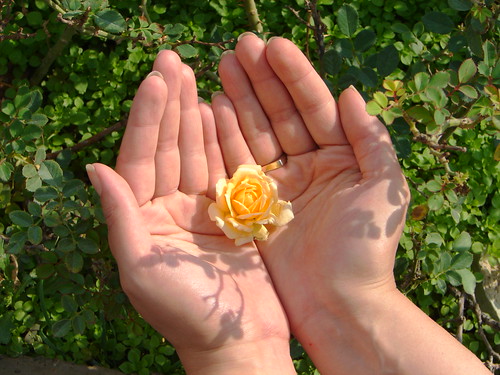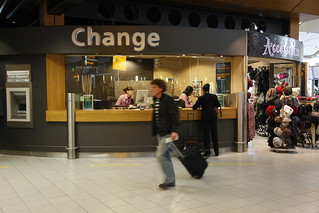14th Sunday in Ordinary Time
Picture: cc Hamed Saber
Sisters and brothers, if I may, l’d like to invite you to do something with me right now. At the count of 3, could you please clench your fists as tightly as you can? And then try to notice how you feel. Can you do that? Good. Ready? 1-2-3, clench! And hold... Notice how you feel... Now, again at the count of 3, slowly unclench your fists. And again notice how you feel. Ready? 1-2-3, slowly... open... How do you feel?...
So what is it like, sisters and brothers? What is it like to have your fists clenched? And then to open them up? Any difference? Of course there is, right? It’s the difference between stress and calm. Between exertion and rest. Between anxious grabbing and the willingness to let go…
It’s helpful to keep this contrast in mind, because it can help us appreciate something that our liturgy is inviting us to consider today. Have you noticed what it is? Recall what we asked God to do for us in the opening prayer: Fill your faithful with holy joy, we prayed, for on those you have rescued from slavery to sin you bestow eternal gladness. And, remember also, how the first reading begins. Rejoice heart and soul, daughter of Zion! Shout with gladness, daughter of Jerusalem!… Sisters and brothers, if there is one thing our liturgy is bringing to our attention today, it is joy.
And I think we can all agree that joy is something that everyone desires. Something we all seek. Except that we have different ways of doing it. Do you know what your own approach is? I’m not sure, but I think, for many of us, the way we seek to be happy is the way taught to us by the world. The way of constant effort. Of anxious exertion. The way of the clenched fist and the gritted teeth. We push ourselves hard, and our children as well, in order to to grab as many of life’s pleasures as possible. We believe that the harder we work, the more we grab, the happier we will be.
For many of us, joy is something we have to win for ourselves. Through sheer force of will. Through steely strength of determination. No one makes us happy. We earn it for ourselves. This is what we learn in society. And, more often than not, we assume that this must be true in the spiritual life as well. We think that happiness is only about effort. How to be more joyful? Well, spend more time in prayer. Give more money to the church. Get involved in more ministries in the parish... More time. More money. More effort. Must mean more joy, right? I’m not sure. Perhaps for some this approach does work. But, then again, isn’t it true that, it can also have the opposite effect? Very often, the demand for more only serves to make us more discouraged. More disillusioned. More depressed. Or, what’s worse, it can also make us more arrogant. More self-righteous. More judgmental.
Which is why it’s important for us to pay attention to the different approach presented to us in our readings today. Notice the reason why Zion is asked to rejoice in the first reading. It’s not because of anything she herself has done. Rather, Zion is invited to rejoice in the victory won for her by her king. Her joy is less something she earns than something she receives. Not only that. Notice also the very curious way in which her king is described. He rides not on a war-horse, but a baby donkey. His is an image not of power and might, but of humility and gentleness. Indeed, we may recall that this is the same passage of scripture applied to Jesus, as he enters Jerusalem on Passion Sunday. Quite clearly, the approach to joy being taught to us here is very different from the way of the world. It is less about exertion and grabbing than resting and receiving. Less about the clenched fist than the open hand.
And this is also the same approach that Jesus teaches in the gospel. Notice how the Lord begins by speaking not of our joy, but of God’s. Yes, Father, for this is what it pleased you to do... God rejoices in revealing Himself to mere children. And isn’t this the only true Source of our own joy? If we are able to rejoice, it is only by sharing in the joy of God. By humbly receiving God’s self-communication to us. Especially in the Mystery that we celebrate at this Eucharist. The Mystery of the Dying and Rising of Christ. And isn’t this why the learned and the clever fall short? Not because God doesn’t reveal himself to them. For the psalm tells us that the Lord is good to all, compassionate to all his creatures. If the learned and clever fail to rejoice, it is only because they are too focused on themselves. Too full of their own expertise. Too wrapped up in their own efforts. Too busy clenching their fists.
In contrast, Jesus issues a moving invitation to those who labour and are overburdened. Those of us who find ourselves desperately struggling to meet the demands of the clenched fist. And perhaps often failing. Jesus invites us to come to Him. To approach Him. The victorious yet humble King. The King who is victorious precisely because he is humble. Humble enough even to let Himself be nailed to a cruel cross to set His people free. We are invited to come to Him with open hands. To receive the joy that He has already won for us through His sacrifice. The joy of realising how much God loves us. Cherishes us. Takes pleasure in us. Wants to give us joy. Without our being able to earn it.
And, quite paradoxically, it is when we do this. When we allow God to open our hands and our hearts to receive God’s love. Especially here in the Eucharist. That we find the energy to do what needs to be done. No longer out of an oppressive burden of obligation. But out of a deep and enduring sense of gratitude. As the psalmist says, all your creatures shall thank you, O Lord, and your friends shall repeat their blessing. Isn’t this also what is described in the second reading? When we open ourselves to receive the love of God in Christ, our interests begin to change. We turn away from the unspiritual toward the spiritual. We allow the Spirit of God to make his home in us. To give us the strength to gradually put an end to the misdeeds of the body. To pray more devoutly. To give more wholeheartedly. To serve more selflessly. To experience, even here on earth, something of the joys of heaven.
Sisters and brothers, if I may, I’d just invite you now, once more, to clench your fists... And then to slowly open them up again… Notice how you feel... Two different postures. Two contrasting approaches. One grabbing… The other receiving… One anxious… The other trusting…
Which one will you choose for yourself today?


